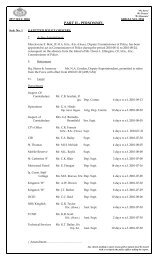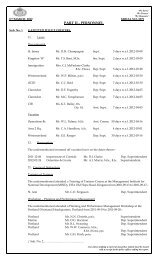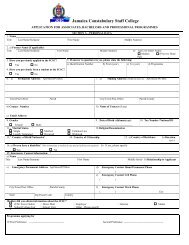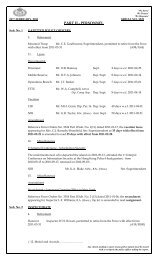Appendices 3354.pdf - Jamaica Constabulary Staff College
Appendices 3354.pdf - Jamaica Constabulary Staff College
Appendices 3354.pdf - Jamaica Constabulary Staff College
You also want an ePaper? Increase the reach of your titles
YUMPU automatically turns print PDFs into web optimized ePapers that Google loves.
APPENDIX ‘A’ TO FORCE ORDERS 3354 DATED 2011-09-15<br />
The JCF’s New Accelerated Promotion Programme (NAPP)<br />
1.0.0 Rationale for a policy change in JCF’s Special Management Selection and Training<br />
Programmes.<br />
1.0.1 The Graduate (Direct) Entry Programme<br />
1.0.2 In 1989 the then Minister of National Security and Justice, the Honourable K.D. Knight, indicated in<br />
his budget presentation that the <strong>Jamaica</strong> <strong>Constabulary</strong> Force (JCF) should seek to attract<br />
Graduates with certain skills.<br />
1.0.3 In April 1994, Cabinet gave approval for a number of proposals emanating from the Hirst and Wolfe<br />
Reports to improve the capabilities of the <strong>Jamaica</strong> <strong>Constabulary</strong> Force.<br />
1.0.4 The proposals included the introduction of the Graduate Entry Programme, the abolition of the rank<br />
of Assistant Superintendent as a promotional rank and its retention to accommodate Graduate<br />
(Direct) Entry Recruits.<br />
1.0.5 In keeping with the recommendations of the Hirst Report and Cabinet's approval, the Ministry of<br />
Finance gave approval for seventy-two (72) posts of Assistant Superintendent of Police to be<br />
upgraded to Deputy Superintendent of Police. Approval was also given for the retention of Assistant<br />
Superintendent of Police to accommodate the Graduate Entry Programme.<br />
1.0.6 On November 17, 1997 vide Cabinet Decision No. 37 the number of posts for Assistant<br />
Superintendent of Police was increased to thirty-one (31) and was subsequently increased to 100<br />
posts.<br />
1.0.7 The first recruitment under the Graduate Entry Programme (GEP) occurred in May 1996, when<br />
eleven (11) Graduates were selected for a two (2) year training programme. Since then two<br />
additional programmes have been conducted: (a) a batch of 21 Graduates were trained between<br />
2002 and 2003 and (b) a batch of 16 between 2006 and 2008. The first two intakes (1996 and 2002)<br />
comprised Direct Entry graduates and serving members who held at least a Baccalaureate Degree.<br />
The final batch of 16 comprised Graduate (Direct) Entry Officers only.<br />
1.0.8 In its initiation in 1996 the Programme was intended to recruit graduates with specialized skills and<br />
competencies to function in specific areas where the JCF was deficient. While this largely drove<br />
the selection of the second cohort of GEP candidates, the status quo has changed for the following<br />
reasons:<br />
a) Civilianization is now the method used to address the need for administrative and<br />
specialised skills in areas that do not require police powers.<br />
b) The need to improve educational standard and provide specialist skills through the<br />
Graduate Entry Programme has been significantly negated by (a) the increasing number<br />
of tertiary level serving members who have gained degrees and other professional<br />
qualifications (b) the increasing number of tertiary level graduates who are willing to join<br />
the JCF at the entry level.<br />
c) While the need may arise for the JCF to recruit Direct Entry Officers in the future, the<br />
greater need of the JCF at this time is the development of leadership and command<br />
capabilities among existing personnel rather than an accumulation of expertise in<br />
specialised academic disciplines.<br />
1.1.0 The Internal Graduate Development Programme (IGDP)<br />
1.1.1 The IGDP was introduced in 2006:<br />
a) as a response to the rapid increase in the number of serving members of the force<br />
acquiring tertiary level education<br />
b) to identify, train and accelerate the promotion of suitably qualified members to fill the void<br />
caused by the high attrition of members in the middle management and supervisory<br />
ranks. The introduction of the IGDP therefore presented these members with the<br />
opportunity for advanced training and promotion to the supervisory and junior command<br />
ranks.<br />
1
APPENDIX ‘A’ (CONT’D)<br />
1.1.2 The introduction of the IGDP corrected the unnecessary requirement in the Graduate (Direct) Entry<br />
Programme whereby serving graduates who participated in the programme had to repeat Basic<br />
Recruit Training. However the IGDP which accelerates serving members (graduates) to the rank of<br />
Inspector is perceived to be discriminatory as their counterparts, the direct entry graduates in the<br />
Graduate Entry Programme, are appointed at the rank of Assistant Superintendent.<br />
1.1.3 The IGDP programme remains relevant as it looks at a pool of talent across the force and selects<br />
the best persons for training and advancement.<br />
1.2.0 The Accelerated Promotion Programme<br />
1.2.1 This is the earliest of the JCF’s special management development programmes to accelerate the<br />
promotion of members to fill existing and emerging positions at the junior command and<br />
supervisory levels of the force. The programme was introduced in 1973. After the first cohort of 12<br />
participants, the programme experienced a hiatus. It was reintroduced in 1990 and has since<br />
graduated five batches of officers. It has been the most successful of the special management<br />
training programmes as graduates from the programme now occupy critical executive positions in<br />
the force.<br />
1.3.0 GENERAL<br />
1.3.1 The GEP, although very relevant at the outset in bringing persons of higher learning with new<br />
perspectives, ideas and thinking into the force, is no longer a significant recruitment strategy for<br />
these purposes as the force is: (a) attracting large number of persons in this category through the<br />
normal recruitment programme and (b) the young and bright serving members have been<br />
qualifying and preparing themselves for mobility in the force. Any future need that may arise in the<br />
force for the engagement of rare skills in sworn office can be accommodated in a new special<br />
management development programme.<br />
1.3.2 One of the merits of the IGDP and APP is that these programmes consider a broad pool of<br />
personnel available from the junior level and select the best suited candidates for development and<br />
acceleration into the officer ranks. They deviate from the normal process whereby commanding<br />
officers select personnel for promotion from a limited pool of personnel under their command – a<br />
process that undoubtedly is skewed toward narrow sectorial interest.<br />
1.3.3 Although all three programmes have essentially the same aim and objectives, they have been<br />
treated as separate programmes therefore negating the value of cross fertilization of ideas,<br />
synergy and camaraderie among the cohorts. If the present practice continues, it has the potential<br />
of resulting in elitism and insularity. This could prove dysfunctional in an organization that is<br />
undergoing reform and modernization of its systems, procedures and practices.<br />
1.3.4 The circumstances outlined above led to a review of the policy of the Graduate (Direct) Entry<br />
Internal Graduate Development and the Accelerated Promotion Programmes which beckons<br />
changes in (a) the approach to recruitment and selection, (b) the training modality, and (c)<br />
deployment of graduates of the programme. The circumstances also strongly advocated the<br />
merging of all the special management training for officers to ensure parity, integration and a<br />
greater level of synergy among the cohorts thereby resulting greater levels of efficiency in the<br />
force.<br />
2.0.0 THE JCF’s NEW ACCELERATED PROMOTION PROGRAMME POLICY (NAPP)<br />
2.0.1 This policy supersedes all previous policies dealing with the <strong>Jamaica</strong> <strong>Constabulary</strong> Force’s<br />
Graduate (Direct) Entry, Internal Graduate Develop and Accelerated Promotion Programmes.<br />
2.1.0 OBJECTIVES<br />
2.1.1 The objectives of the NAPP shall be to select, train and develop candidates to ensure :<br />
a) that a core of young, energetic, bright and well trained change agents who are able to<br />
generate high value at early stages in their career are available to fill existing and emerging<br />
positions at the junior command level of the force.<br />
b) that candidates develop the requisite leadership, management and command competencies to<br />
effect change leadership consistent with the philosophy and strategies of Community Policing<br />
c) the appropriate induction (where necessary), orientation and integration of candidates into the<br />
J.C.F’s officer corps.<br />
d) enhanced efficiency, effectiveness and professionalism in policing<br />
2.1.2 The <strong>Jamaica</strong> <strong>Constabulary</strong> Force will be responsible for::<br />
a) the selection of suitable candidates,<br />
2
APPENDIX ‘A’ (CONT’D)<br />
b) The design of an appropriate training and development programme<br />
c) The administration of appropriate training and mentorship<br />
2.2.0 TERMS AND CONDITIONS<br />
2.2.1 The rank of Assistant Superintendent shall be reserved for appointments, through the NAPP, of<br />
members of the JCF at age 35 or below who (a) are holders of at least an accredited Bachelors<br />
Degree or equivalent qualification (b) have at least two years service with at least three CAPE<br />
passes at level II at the minimum Range 3 or GCE “A’ Level with a minimum pass of C. Such<br />
members must be of the highest integrity, with performance of a consistently high level and who<br />
demonstrate outstanding leadership qualities. Members of the ISCF selected for the programme<br />
enter at an appropriate rank.<br />
2.2.2 Candidates appointed to the rank of Assistant Superintendent in the programme will be advanced<br />
to the rank of Deputy Superintendent two (2) years after successfully completing the officer training<br />
programme, provided they demonstrate the requisite maturity and competencies. Eligibility for<br />
further promotion shall be in accordance with existing policy.<br />
2.2.3 Candidates will be assessed and reported on at the end of each module to determine their<br />
suitability for progression in the programme. Where a member is unable to meet the requirements<br />
of the programme such member will be withdrawn from the programme and returned to the rank at<br />
which he/she commenced the programme<br />
2.3.0 RECRUITMENT AND SELECTION<br />
2.3.1 Notification for application to the programme will be published in Force Orders. The recruitment<br />
requirements will be as follows:<br />
a) Applicants must have at least a Bachelors Degree or equivalent qualification from an<br />
accredited tertiary institution or<br />
b) Applicants who are not the holders of a Bachelors Degree, must have at least two years<br />
service and possess accredited Diplomas or Associate Degrees or<br />
c) Applicants must have at least two years service and at least three CAPE passes at the<br />
minimum Range 3 or GCE “A’ Level with a minimum C grade pass<br />
2.3.2 Selection Process: The selection process is comprised of four phases: -<br />
a) Phase I Written Exam<br />
b) Phase II Assessment Centre<br />
c) Phase III Panel Interview<br />
d) Phase IV Integrity Screening (Ethics Committee Interview and Polygraph Test)<br />
2.3.3 The Written Examination (Phase I) shall comprise:: -<br />
a) Argument, and Logical Reasoning<br />
b) Comprehension and Writing Skills<br />
2.3.4 Candidates must be successful in Phase 1 in order to advance to Phase II – the Assessment<br />
Centre. A pre-screening of applicants will be conducted prior to their admission to the first phase<br />
of the selection process. This will include a report on their work, worth and conduct from their<br />
Commanding Officers.<br />
2.3.5 Assessment Centre (Phase II) - Candidates will be engaged in a range of individual and group<br />
exercises designed to test their ability in :<br />
a) Comprehension and Writing Skills<br />
b) Critical Thinking<br />
c) Problem Solving<br />
d) Systematic Reasoning<br />
e) Communication<br />
f) Leadership & Team Skills<br />
3
APPENDIX ‘A’ (CONT’D)<br />
2.3.6. Panel Interview (Phase II): Candidates who are successful in the Assessment Centre will be<br />
interviewed by a Panel constituted as under:<br />
a) A senior police officer (Chairman)<br />
b) A representative of the Police Service Commission<br />
c) The Director of Human Resource (JCF)<br />
d) A representative from the Ministry of National Security<br />
e) A Behavioural Specialist ( Psychologist)<br />
2.3.7 The Panel will assess each candidate in the following areas:-<br />
a) Personal Impact<br />
b) Mental Agility<br />
c) Communication Skills<br />
d) An appreciation of the policing career and its challenges<br />
e) Knowledge of Current Affairs<br />
2.3.8 Candidates who are successful in this phase will move on to the next phase.<br />
2.3.9 Integrity Screening: This will comprise of clearance from the Anti-Corruption Branch, the National<br />
Intelligence Bureau, the Ethics Committee and Polygraph Testing.<br />
2.4.0 TRAINING PROGRAMME<br />
2.4.1 The training programme is comprised of five (5) modules the first of which will not be applicable to<br />
candidates who have already completed their basic recruit training. The phases are:<br />
a) Module 1 - Basic Recruit Training (16 weeks)<br />
b) Module 11 - Personal Effectiveness (8 weeks)<br />
c) Phase 111 - Advanced Academic Development (20 weeks)<br />
d) Module IV- Professional Development (<strong>Staff</strong> and Junior Command Course Special) 24<br />
weeks<br />
e) Module V – Attachment and Mentoring<br />
2.3.2 Basic Training – All applicants in this programme must complete the regular basic training in laws<br />
and police procedures at the <strong>Jamaica</strong> Police Academy. This will provide them with the<br />
fundamentals to develop organisational understanding to facilitate the transition from civilian life to<br />
law enforcement. Strong focus will be placed on the organisation’s mission, vision, philosophy and<br />
values. It will also provide for the theoretical and practical training in Basic Laws, Police Duties and<br />
Procedures, Human Rights and Use of Force and Firearms.<br />
2.3.3 The Personal Effectiveness Module is to apprise participants of the leadership/managerial profile<br />
and accompanying competencies that they must acquire and display. In light of this they will be<br />
made to conduct self analysis which should lead to self discovery and adaptation to meet the<br />
challenging role of leadership and or management. It includes a range of topics which deal<br />
primarily with matters of the total self and building a range of core skills that will ensure effective<br />
self management, leadership, teamwork, systematic problem solving, management of the human<br />
capital and the efficient utilization of organizational resources etc.<br />
2.3.4 The Academic Development Module will provide an academic platform to build participants’<br />
understanding of the socio-cultural context and environment within which they police and the<br />
challenges they will encounter as future leaders and managers. This Module which will be<br />
delivered jointly by the University of the West Indies and the <strong>Jamaica</strong> <strong>Constabulary</strong> <strong>Staff</strong> <strong>College</strong><br />
will focus on relevant themes in Psychology, Sociology, Criminology; Penology and the application<br />
of Information Technology to crime mapping and crime fighting.<br />
4
APPENDIX ‘A’ (CONT’D)<br />
2.3.5 Professional Module (<strong>Staff</strong> & Junior Command (Special) Course) - Candidates will participate<br />
in a six months <strong>Staff</strong> and Junior Command Course (Special) The programme will be grounded in<br />
the philosophy of building a highly competent corps of leaders/managers who demonstrate a<br />
coherent professional image through understanding, internalising and modelling the corporate<br />
values, strategic intent, operations and administration of the Force. The main themes of the course<br />
are: Caribbean Security Environment and Challenges, Policing a Changing Society, Introduction to<br />
the Economic Cost of Crime, Public Administration, Police Management (Operations, Crime and<br />
Administration), Leading and Managing Change, Managing People, Managing Resources,<br />
Managing Stakeholders Interests.<br />
2.3.6 Attachment and Mentorship - The aim of the divisional attachment and mentorship is to expose<br />
the officer to fundamentals in police administrative, operational and investigative practices and<br />
procedures. Participants will be assigned mentors to assist them in integrating in the organisation,<br />
gaining experience and developing competencies in police administration and operations in line<br />
with the organisation’s mission, vision, philosophy and values.<br />
2.3.7 Graduation: At the end of the taught courses, successful candidates will graduate from training.<br />
This is before they enter the mentorship phase. A career development programme will be<br />
designed for the graduates to guide their gradual exposure and further development in vital areas<br />
of police leadership and command.<br />
3.0.0 ADMINISTRATION<br />
3.1.0 Accommodation: Living accommodation will be provided at the <strong>Staff</strong> <strong>College</strong> for candidates<br />
during all three modules of the programme.<br />
3.3.0 Assessment:<br />
3.3.1 A rigorous process of assessment will be maintained throughout the programme to ensure full<br />
participation and development of the individual candidate. Consequently a range of approaches<br />
will be adopted to assess individual and team development processes.<br />
3.4.2 Assessment: Assessment Reports on the progress of the Candidates will be in accordance with<br />
the Police Service Regulations, 1961 and submitted as follows: -<br />
a) The first report will be done at the end of the Recruit Basic Training<br />
b) The second report will be done at the end of the Personal Effectiveness Course<br />
c) The third Report is due at the end of the Academic Development Course and written<br />
examinations<br />
d) Fourth report will be done at the end of the period the Professional Development Course<br />
(<strong>Staff</strong> and Junior Command Course Special ) and written examinations<br />
e) The fifth report will be done at the conclusion of the Attachment and Mentoring phase<br />
3.5.1 Advancement: At the commencement of the programme constables and corporals will be<br />
advanced to the rank of sergeant. Upon the successful completion of Module 2 candidates will be<br />
advanced to the rank of Assistant Superintendent. On successful completion of the Professional<br />
Attachment and Mentorship Phase candidates will be eligible for advancement to the rank of<br />
Deputy Superintendent on a competitive basis.<br />
4.0.0 General<br />
4.0.1 On completion candidates will be assigned to specific Portfolios/Areas/Branches/Divisions of the<br />
Force. Their assignment will be determined based on their respective competencies, aptitudes and<br />
the existing organisational needs.<br />
5
APPENDIX ‘B’ TO FORCE ORDERS 3354 DATED 2011-09-15<br />
Establishing Strong Relationships<br />
Part 1 - Compatibility<br />
Many people erroneously believe that "opposites attract", and seek a partner with<br />
interests opposite to their own under the illusion that this is a good way to form an<br />
enduring bond. Partners, who get caught in this lie, often suffer painful consequences.<br />
While it is true that opposites do attract sometimes, this attraction usually doesn't hold<br />
up to the reality of everyday life and commitment.<br />
Incompatibility remains the strongest factor contributing to breakup. Psychologists have<br />
discovered that there are certain types of incompatible relationships that are doomed to<br />
fail from the start. We call these Incompatible Relationships.<br />
Incompatible relationships<br />
The fact that you love each other does not mean that you were meant to be. People<br />
should be warned of the dangers of dating someone with vast differences. The following<br />
is a summary of the five most common incompatible types of relationships.<br />
1. The Missionary Relationship<br />
In the missionary relationship one partner is trying to convert the other person to the<br />
faith. The common denominator of the missionary relationship is the need to justify the<br />
relationship on evangelistic grounds. For starters, how ludicrous to think that you can<br />
establish a healthy bond with someone on the basis of a hidden agenda! Unsurprisingly,<br />
after hanging on to these dead-end relationships, it's even more difficult to break it off in<br />
the end. The bottom line is that when there is spiritual or religious incompatibility - get<br />
out. It's too difficult to judge the sincerity of one's spiritual quest, when the emotions of<br />
love and romance are involved. The sacrifice is usually unjustified. Missionary<br />
relationships simply don't work.<br />
2. Sacrificial Relationship<br />
Some women tragically apply the mission of falling for men who are emotionally "sick<br />
and dying" for their love lives. Against all odds, they attempt to love, comfort, and take<br />
care of their lovers, hoping to nurture them back to emotional health. It reminds of a<br />
children’s game -one is the nurse, and the other is the patient. If you have a tendency to<br />
hang on to needy people in order to "love" them to health, then you need to ask yourself<br />
why. Why do you have this unquenchable need to be needed You are called to be an<br />
equal partner in a relationship, not a shrink, surrogate parent, missionary, or nurse.<br />
Sacrificial relationships may seem exciting and challenging at first, but they usually end<br />
in disillusionment. If this describes you, you need remedial work - get a life!<br />
3. The Exotic Relationship<br />
When two people from radically different cultural or ethnic backgrounds get together it’s<br />
called an Exotic relationship. At the beginning you might be intrigued by the accent,<br />
cultural differences, and mysterious demeanor of the other person. The relationship can<br />
be based on the allure of being with someone completely different in so many ways.<br />
Sure, exotic relationships are exciting and adventurous, but they're extremely<br />
impractical. Under the best of circumstances, dating and marriage are difficult and<br />
challenging. Before you invest time, energy, and money into an exotic relationship,<br />
consider the fact that the odds of this kind of relationship actually making it one in a<br />
million.<br />
4. “ Unequally aged” Relationship<br />
The hallmark of the unequally aged relationship is the considerable age gap between<br />
partners. If you find yourself saying, "Yes, sir" to your partner, then you may be in this<br />
particular type of relationships. If your partner is still telling you stories about the "good<br />
old days" in the fifties, then this is your case. These types are usually trying to<br />
compensate for emotional insecurity, or expecting their partner to fill in for Mom or Dad.<br />
Regardless of the psychological reasons behind this trend, in most cases this<br />
substantial age difference is another example of incompatible relationships.<br />
Unequally aged relationships provide a sense of emotional or financial security at their<br />
early stage, but eventually they hit several snags of incompatibility. Energy levels can be<br />
drastically different. Cultural connecting points such as movies, historical events, music,<br />
and past trends will also be different. These things may seem trivial, but they are<br />
extremely important when you are seeking to build a long-lasting bond.<br />
6
5. Rebellious Relationship<br />
The first sign of this kind of relationship is the need to date someone purely out of your<br />
‘ caste’ . Rebellious relationship daters choose a partner, who is exactly the opposite<br />
of everything their families would want for them. Most of the time, people engaged in<br />
this kind of relationship, are merely angry with their parents or attempting to define<br />
themselves as a way to establish a sense of independence. However, there are more<br />
constructive ways to deal with anger or establish independence – understanding,<br />
forgiveness and maturity. Save yourself the pain and embarrassment by staying clear of<br />
any kind of rebellious relationship.<br />
Compatible relationships<br />
A relationship, by definition, is the connecting of people. Therefore, to have a successful<br />
relationship with the opposite sex you must connect on many levels. This is what is<br />
called Compatible Relationships. Example below shows that in order to truly connect<br />
with another person, you must be compatible on three general levels: spiritual, physical,<br />
and social.<br />
1.The Spiritual Connection<br />
If you cannot connect with your partner on a spiritual level, your relationship will be<br />
difficult. What you believe about God, how you pray, which holidays you celebrate,<br />
which books you hold to be sacred, and your opinion on baptism are just a few<br />
components that make up your spiritual belief system. When you don't see eye to eye<br />
with your partner in these areas, then you are compromising something that is deeply<br />
ingrained in you. Your spirituality and how that is expressed is the most intense and<br />
intimate part of you. Tremendous heartache and frustration will occur, when two people<br />
are unable to connect and share this most intimate part of their lives.<br />
2. The Physical Connection<br />
Being sexually attracted to your partner is a prerequisite for a healthy relationship.<br />
Having a spiritual connection is not enough. You must have that spark, that chemistry,<br />
that attraction that draws you to the person like a magnet. There must be "something" in<br />
the way that person looks, moves, laughs, speaks, or smiles; something that compels<br />
you to want to be with him or her. All great relationships have some element of<br />
chemistry, and you either have it or you don't.<br />
3. The Social Connection<br />
Some people often neglect social compatibility, though this very area creates lots of<br />
stresses on relationships. Social compatibility primarily concerns family patterns and<br />
social relating.<br />
The old saying, "The apple doesn't fall far from the tree," usually holds true. Who you<br />
are, and many of your life perspectives stem directly from your family upbringing. If you<br />
grew up in a home in which you received love, support, encouragement and security<br />
from your parents, then you probably have a good foundation for building a happy<br />
family. If you didn't grow up in such an environment, then you would have to work harder<br />
to develop a strong bond. Some of the important issues associated with family<br />
background are holiday customs, family rules, finances, domestic responsibilities, and<br />
rearing children.<br />
The other area of connecting at the social level deals with patterns of relating. This<br />
dimension of a relationship covers a wide variety of concerns, including social skills,<br />
communication style, and intellectual compatibility.<br />
What does it mean to be compatible Well, similarities between people make life<br />
together much simpler. Being together involves compromise, and people can reach<br />
these compromises more easily when they share common values and interests. Sure,<br />
sometimes opposites can attract, but for a stable relationship bet on similarity.<br />
If you are already in a relationship that is marked by incompatibility based on any of the<br />
above factors and you decide to risk continuing, you could benefit from having a<br />
discussion with your partner in which you identify the areas of incompatibility and<br />
anticipate how these differences are likely to manifest themselves. Work out a plan for<br />
resolving these types of problems if they do occur. It would be helpful to have this<br />
discussion with a trained counselor. Remember it isn’t your fault or your partner’s fault<br />
that you are different.<br />
Adapted from SLY.com and modified by the Medical Services Branch.<br />
7
September 15, 2011 Vol. 1X Issue 111<br />
INTERNATIONAL COMMUNICATION SIGNALS<br />
10-1 Good Signal 10-20 Intoxicated Pedestrian<br />
10-2 Stop Transmitting 10-21 Hit and Run<br />
10-3 Acknowledgement 10-22 Reply to Message<br />
10-4 Busy, Stand by unless urgent 10-23 Message Cancellation<br />
10-5 Repeat 10-24 Message Received<br />
10-6 Report Prowler 10-25 En Route<br />
10-7 Civil Disturbance 10-26 Estimate Time of Arrival<br />
10-8 Complete Assignment Quickly 10-27 Need Assistance<br />
10-9 Location 10-28 Chase in Progress<br />
10-10 Call by Telephone 10-29 School Crossing<br />
10-11 Arrive at Scene 10-30 Will Be Late<br />
10-12 Assignment Complete 10-31 Officer or Operator on Duty<br />
10-13 Beginning Tour of Duty 10-32 Improper Parked Vehicle<br />
10-14 Ending Tour of Duty 10-33 Records Indicate Wanted/stolen<br />
10-15 Requesting Permission to leave Patrol Zone<br />
10-16 Traffic Lights out Code 1 Acknowledge receipt of message<br />
10-17 Accident Code 2 Out on investigation<br />
10-18 Wrecker Needed Code 3 Out of Service to Eat<br />
10-19 Ambulance Needed<br />
Alphabet<br />
A-alpha E-echo I-india M-mike Q-quebec<br />
U-uniform<br />
Y-yankee<br />
B-bravo F-foxtrot J-juliet N-november R-romeo V-victor Z-zulu<br />
C-charlie G-golf K-kilo O-oscar S-sierra<br />
W-whisky<br />
D-delta H-hotel L-lima P-papaya T-tango<br />
X-x-ray<br />
8
MY LOT<br />
A judge was interviewing a woman regarding her pending divorce, and asked,<br />
"What are the grounds for your divorce"<br />
She replied, "About four acres and a nice little home in the middle of the property<br />
with a stream running by."<br />
"No," he said, "I mean what is the foundation of this case"<br />
"It is made of concrete, brick and mortar," she responded.<br />
"I mean," he continued, "What are your relations like"<br />
"I have an aunt and uncle living here in town, and so do my husband's parents."<br />
He said, "Do you have a real grudge"<br />
"No," she replied, "We have a two-car carport and have never really needed one."<br />
"Please," he tried again, "Is there any infidelity in your marriage"<br />
"Yes, both my son and daughter have stereo sets. We don't necessarily like the<br />
music, but the answer to your questions is yes."<br />
"Ma'am, does your husband ever beat you up"<br />
"Yes," she responded, "about twice a week he gets up earlier than I do."<br />
Finally, in frustration, the judge asked, "Lady, why do you want a divorce"<br />
"Oh, I don't want a divorce," she replied. "I've never wanted a divorce.<br />
My husband does. He said he can't communicate with me."<br />
BIRTHDAYS, ANNIVERSARIES AND SPECIAL EVENTS CLUB Esprit<br />
de Corps extends best wishes to the following persons who celebrate<br />
birthdays in the month of September.<br />
Det/Sgt. M. Blackwood<br />
September 16<br />
Cons. R. Cleary<br />
September 22<br />
Cpl. G. Robb<br />
September 23<br />
W/Cpl. S. Gordon<br />
September 23<br />
W/Dist/Cons. Y. Brown<br />
September 23<br />
Kingston Central<br />
Kingston Central<br />
FTTU<br />
Mobile Reserve<br />
Kingston Central<br />
PAY A VISIT! GIVE A CHEER<br />
Cmdr N. Green St. Ann (Home) 390-3222<br />
Spl. Sgt. P. O’gilvie Harman Barracks<br />
W/Spl/Sgt. T. Williams Harman Barracks<br />
Spl/Sgt. A. Evans Harman Barracks<br />
S/Cpl. R. Leichman Harman Barracks<br />
W/Spl/Cpl. S. McDonald Harman Barracks<br />
Cpl. L. Aarons Motorized Patrol (KPH, Ward 2 North) 314-5754<br />
Cpl. R. Smith St. Ann (Home) 330-5960<br />
Spl/Cpl. P. Thomas Harman Barracks<br />
Cons. W. Brooks St. Ann (Home) 367-7279<br />
Cons. M. Brooks St. Ann (Home)<br />
Cons. C. Anderson St. Ann 457-2270<br />
Spl/Cons. K. Miller St. Ann (Home) 856-0588<br />
Dist/Cons. O. Johnson St. Ann (National Chest Hospital) 360-6795<br />
Dist/Cons. A. Campbell St. Ann (Home) 487-8653<br />
Cons K. Stevenson St. Ann (Home) 372-1429<br />
Cons. D. Wright Clarendon (Home) 459-5543<br />
Cons. L. Ellison Clarendon (St. Ann’s Bay Hospital) 469-9398<br />
Cons. N. Simpson Clarendon (Home)<br />
Spl/Cons. A. Braham Harman Barracks<br />
Spl/Cons. H. Myres Harman Barracks<br />
Spl/Cons. D. Sterling Harman Barracks<br />
Convalescent Home/St. Elizabeth - 634-0432/634-1091<br />
9
Sgt. B. Lloyd<br />
Det/Cpl. C. Stern<br />
Cpl. A Duhaney<br />
W/Cons. A. Lindsay<br />
Cons. A. Forbes<br />
Det/Cons J. McKenzie<br />
Linstead<br />
Spanish Town<br />
Barrett Town<br />
Hunts Bay<br />
Coral Gardens<br />
Spanish Town<br />
It is with deep and sincere regret that Esprit de Corps announces the passing of Mr.<br />
Lloyd Wilbert, father of Detective Woman Corporal Tricia Johnson of Flying Squad.<br />
The Thanksgiving Service will be held on Sunday, September 25, 2011 at the May Pen<br />
Seventh Day Adventist Church, located at 87 Fernleigh Avenue, Clarendon at 2:00<br />
p.m. Interment follows at the Denbigh Cemetery.<br />
QUOTE OF THE WEEK<br />
“It’s important to make sure that we’re talking with each<br />
other in a way that heals, not in a way that wounds." -<br />
Barack Obama, 44th U.S. President.<br />
From the Desk of the Editor……<br />
Director: DSP Steve Brown MA, BA, Dip – Med & Com.<br />
Editor in Chief: Sgt. Kimesha Grindley, BSc. (Hons.) Pub.Sec. Mgmt<br />
Editor: Dist./Cons. Anika Richards, BA, - Med & Com.<br />
C/o The <strong>Constabulary</strong> Communication Network 101 Old Hope Road,<br />
Kingston 6.<br />
Tel. 978-2729, 978-2214, 978-2179, 978-8885, Fax: 978-8046, E-mail ccnops@gmail.com<br />
NOTE FROM THE EDITOR: DEADLINE FOR SUBMISSION OF INFORMATION FOR PROMULGATION IN ESPRIT<br />
DE CORPS IS THURSDAY AT 9:30 A.M. INFORMATION SUBMITTED AFTER THE DEADLINE WILL BE<br />
PUBLISHED THE FOLLOWING WEEK<br />
10



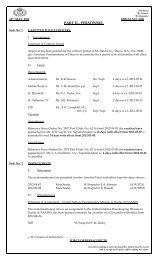
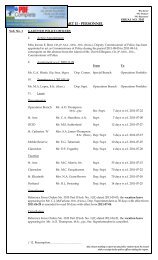
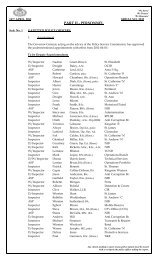
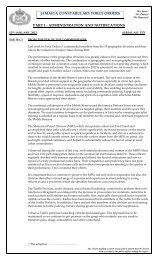
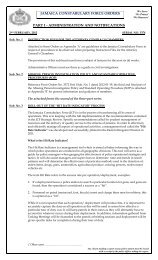
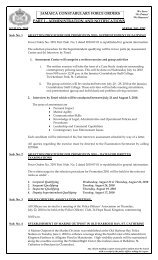
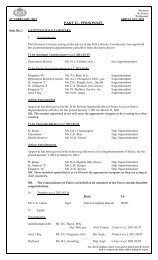
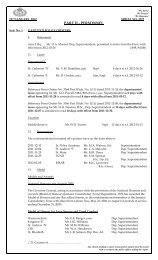
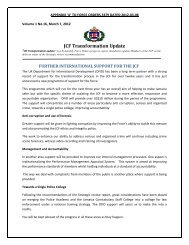
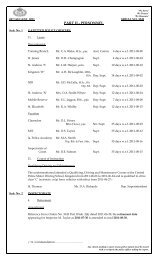
![Force Orders 3419A dated 2012-12-13[1].pdf](https://img.yumpu.com/49571074/1/158x260/force-orders-3419a-dated-2012-12-131pdf.jpg?quality=85)
